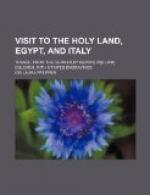This morning I awoke at Ferrara, where the carriage was to be changed once more. I availed myself of a few spare hours to view the town, which, on the whole, rather resembles a German than an Italian place. It has fine broad streets, nice houses, and few arched ways in front of them. In the centre of the town stands a strong castle, surrounded by fortifications; this was once the residence of the bishop.
At nine o’clock we quitted this pretty town, and reached the Po an hour afterwards. We were ferried across the stream; and now, after a long absence, I once more stood on Austrian ground. We continued our journey through a lovely plain to Rovigo, a place possessing no object of interest. Here we stayed to dine, and afterwards passed the Adige, a stream considerably smaller than the Po. The country between Rovigo and Padua was hidden from us by an impenetrable fog, which prevented our seeing fifty paces in advance. At six o’clock in the evening we reached Padua, our resting-place for the night.
Early next morning I hastened onwards, for I had already seen Padua, Venice, Trieste, etc. in the year 1840.
I reached my native town safely and in perfect health, and had the happiness of finding that my beloved ones were all well and cheerful.
During my journey I had seen much and endured many hardships; I had found very few things as I had imagined them to be.
Friends and relations have expressed a wish to read a description of my lonely wanderings. I could not send my diary to each one; so I have dared, upon the representations of my friends, and at the particular request of the publisher of this book, to tell my adventures in a plain unvarnished way.
I am no authoress; I have never written anything but letters; and my diary must not, therefore, be judged as a literary production. It is a simple narration, in which I have described every circumstance as it occurred; a collection of notes which I wrote down for private reference, without dreaming that they would ever find their way into the great world. Therefore I would entreat the indulgence of my kind readers; for—I repeat it—nothing can be farther from my thoughts than any idea of thrusting myself forward into the ranks of those gifted women who have received in their cradle the Muses’ initiatory kiss.
NOTES.
{23} A florin is worth about 2s. 1d.
{30} TRANSCRIBER’S NOTE: “Use of the Reaumur scale was once widespread, but by the late 19th century it had been supplanted by other systems.” (Encyc. Brit.) Some conversions to currently-used scales (rounded down) are given here:—
Reaumur Fahrenheit Celsius
16 68 20
18 72 22
20 77 25
22 81 27
24 86 30
26 90 32
28 95 35
30 99 37
32 104 40
34 108 42
36 113 45
38 117 47
40 122 50
43 128 53




